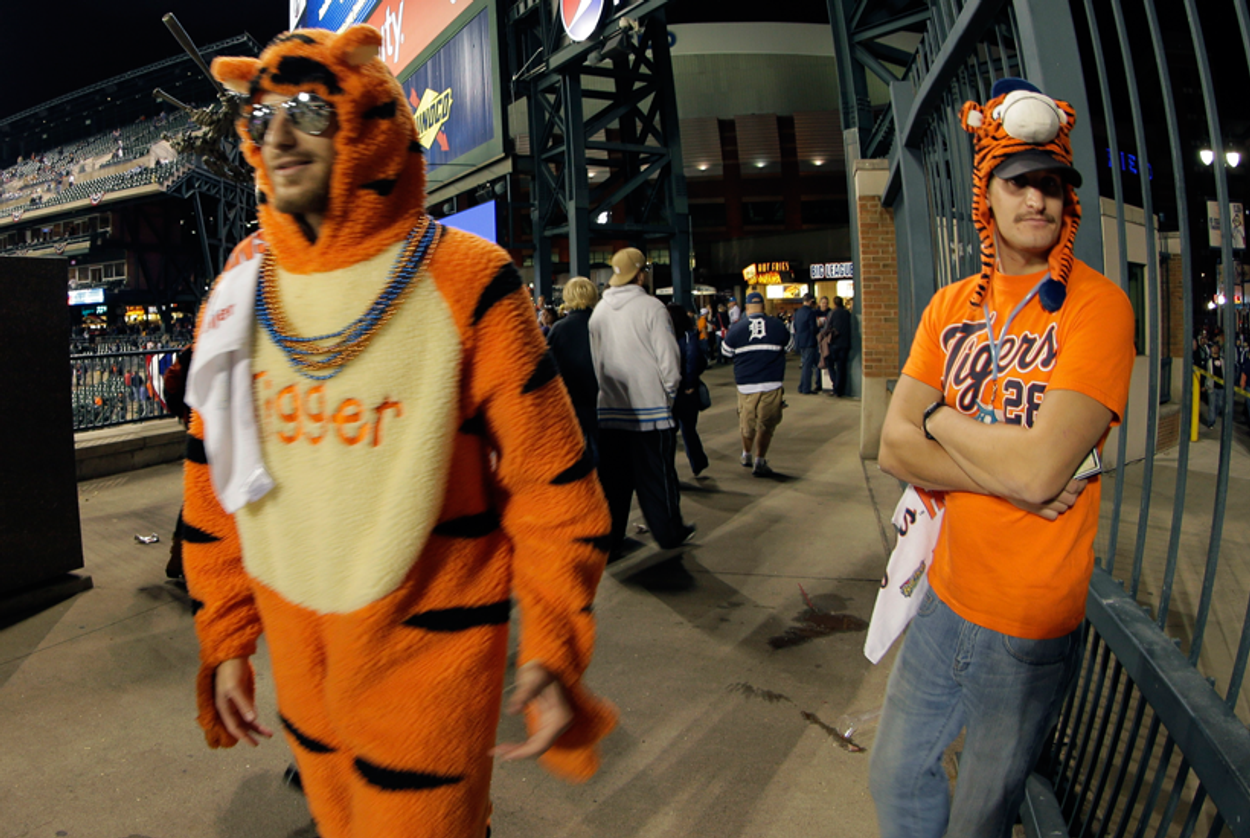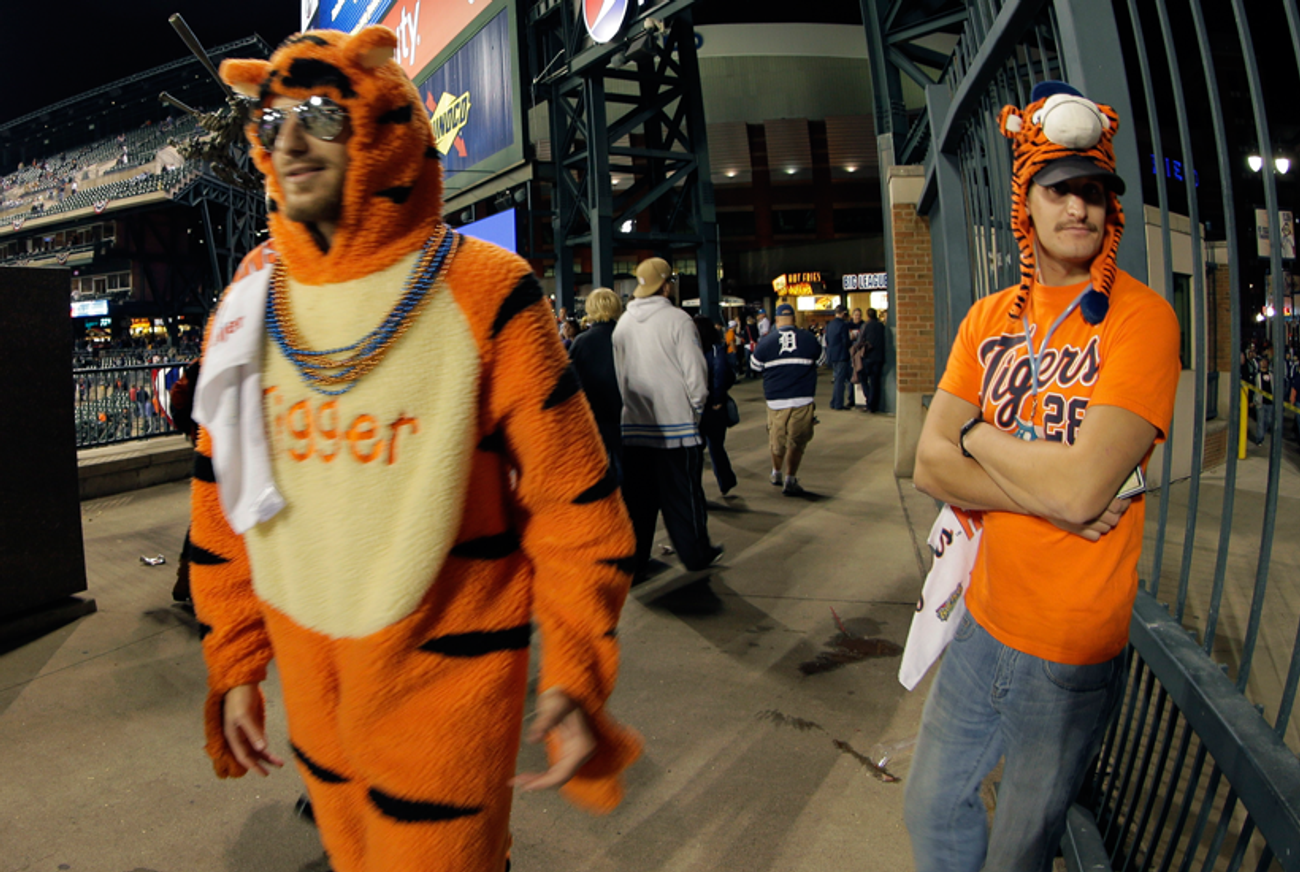Why My Home Team Will Always Be Detroit, Even Though I Live in Boston
My father started rooting for Detroit when Hank Greenberg played for the Tigers. Now it’s an enduring family tradition.




Announcers on sports radio were talking this summer about recently signed New England Patriot Tim Tebow wearing No. 5, which led to a debate about sports’ all-time best No. 5’s. Joe DiMaggio, Nomar Garciaparra, Kevin Garnett, and Johnny Bench were mentioned. All worthy choices, yet I sat in my car yelling, “And Nick Lidstrom. And Nick Lidstrom. And Nick Lidstrom.”
I’m sure I was the only one yelling Lidstrom’s name at the dashboard, since I was listening to a Boston station, and two things Boston sports radio doesn’t fawn over are hockey and athletes from opposing teams. There’s no doubt that Lidstrom belonged in the discussion: The Detroit Red Wing defenseman is bona fide with four Stanley Cups and seven Norris trophies in his hockey career, but I’m also incredibly biased because I’m a lifelong Detroit fan.
I’m not from the Motor City, and I’ve never lived there; I grew up 15 minutes outside Boston and now live 30 minutes outside the city. I got this love of Detroit from my father—who also was not from the city and never lived there.
Jack Calechman was born in 1927 in New Haven, Conn. He loved sports, but in a state that had no professional teams, loyalties usually went with either the Red Sox or Yankees. My father had different plans. There was only one guy for the Jewish kid, and that was Hank Greenberg. He wasn’t merely on a roster, or a decent player for a Jew. He dominated the game, and he just happened to be Jewish. He hit for average and power. He won two World Series titles. In 1934, he sat out a game during the pennant race because it fell on Yom Kippur, making him even more of a hero to Jews across America. And in 1935, when he won his first of two MVP awards, my father was 8 years old. Hank Greenberg played for the Detroit Tigers.
As long as he was pulling for the Tigers, my dad decided to adopt all the teams from Detroit, which was fine when it was just his life. When I came along, though, his challenge became convincing someone else that rooting for a home team 700 miles away was a reasonable path. My father was of his generation, a man of actions more than words, so he never gave a mesmerizing speech on the subject. He just got to me early, and without any pushback I joined him as a fan of the Tigers, Red Wings, Pistons, and even the Lions.
And this dedication came with another feature: no allegiance to any Boston teams. They’ve never been a backup or second choice if Detroit isn’t around. I’ll only slightly root for one if it helps Detroit in the standings, but even then, it’s difficult and uncomfortable. The last Stanley Cup was my imperfect storm. My favorite sport pitted Boston against the Wings’ rival, the Chicago Blackhawks. I watched and understood that it was a good series, but I ended up just feeling sad and conflicted for six games. So, when the Tigers make their only trip to Fenway this season Sept. 2 through 4, there’s no win-win proposition for me. I will be either incredibly happy with each game’s outcome or I will avoid looking at any sports page until the results change.
This, I know, is completely rational behavior for a 12-year-old. But I am 45, and I accept that this is the way of my world and that it’s partly due to my father’s machinations. By the time I was old enough to realize I would never agree with any Boston Garden chants of “De-fense,” I didn’t care. I knew deep down that our arrangement was strange, but ultimately, my dad was with me and that was enough.
Besides, I liked what he gave me, although truth be told, it didn’t make adolescence any easier. The Jewish reason for my allegiance never caused any friction growing up. I was ostracized for liking teams that were not in Boston—teams that were also not particularly good. In the ’70s, the Tigers were beyond awful, and my friends were quick to point this out at every possible opportunity in the gentle way that only preteen boys can. The Pistons were forgettable. The Red Wings were known as the Dead Wings. And the Lions were simply the Lions.
My persistence eventually paid off—a World Series in 1984, celebrated with no one, since my parents had a wedding that evening and apparently my father had other priorities—but even then, things didn’t get easier. The Pistons became a genuine and hated Celtics rival, though even their mothers would never describe them as remotely likable. I was probably the only person in Boston rooting for Bill Laimbeer. Devotion will do that to you.
I realize that sports is sometimes the only way for fathers and sons to communicate. My dad and I were not pioneers in that respect, but by pulling for Detroit in Boston, we also had just our thing. We usually caught one Tigers game a year, a tradition that changed when my father started slowing down and division realignments brought Detroit’s teams around less often.
This was especially the case with the Red Wings, who are now returning to the Eastern Conference but had been something like a comet sighting since the early ’80s, seemingly coming to town once every 10 years. January 2004 was one of those times. It was a Sunday afternoon game and, at the last minute, I called my dad about going. Half an hour before face-off, we were at the ticket booth considering two seats on the glass. We decided it was worth the splurge. For the first 15 minutes, I was 12 years old again, unable-to-sit-still giddy. The thrill of that moment never completely faded, even to this day.
That was our last game together. My dad passed away in early 2007, going out with the knowledge that the Red Wings were perennially solid, the Pistons had yet to devolve into their current state, the Tigers had taken 22 years but finally made it back to the Series, and even the Lions had won their last game of the season.
My son was born in late 2011, and with him came the chance to assess and decide what family beliefs would move forward. I thought about it for a moment and wondered if he really needed this tradition in his life; I could save him a little pain and isolation from his friends. Actually, the contemplation only lasted half a moment. Not many toddlers can pull off Tiger orange. Milo can. When he’s a little older, I’ll flesh out the history and tell him about Hank Greenberg’s career statistics. Like that he batted .313, hit 331 home runs, drove in 183 runs in one season, and served four years during World War II.
And that he also wore No. 5.
***
Like this article? Sign up for our Daily Digest to get Tablet Magazine’s new content in your inbox each morning.
Steve Calechman is a stand-up comedian and freelance journalist. He’s a contributing editor for Men’s Health and a columnist for Boston Parents Paper.
Steve Calechman is a stand-up comedian and freelance journalist. He’s a contributing editor for Men’s Health and a columnist for Boston Parents Paper.